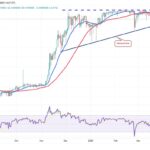In recent developments within the cryptocurrency sector, FDUSD, a stablecoin issued by Hong Kong-based First Digital, has experienced a significant dip from its standard $1 price peg, raising concerns among investors about its reserve stability. The coin’s value fell to $0.87 against Tether’s USDT and $0.76 against Circle’s USDC on the Binance exchange, where it is primarily traded. While FDUSD later regained some footing, stabilizing around $0.98, it still struggles to maintain its anticipated value.
The turbulence surrounding FDUSD coincided with a report by CoinDesk highlighting that some reserves associated with the TrueUSD stablecoin were trapped in less-liquid investments. This led to Tron founder Justin Sun intervening, as he stepped in to assist the issuing company, creating further speculation about the health of First Digital’s finances. Sun claimed in a recent post on X that First Digital Trust (FDT), responsible for managing TUSD reserves, is essentially insolvent and called on users to act quickly to secure their assets.
“First Digital is completely solvent,”
stated the company in response, firmly asserting that every dollar backing FDUSD is “secure, safe and accounted for with US backed T-Bills.” They criticized Sun’s remarks as part of a “smear campaign” designed to undermine their business due to competitive tensions.
Further documenting their financial standing, FDUSD released a monthly reserve report confirming that it holds around $2 billion in assets, primarily in U.S. Treasury bills, with smaller portions allocated to repo facilities and fixed deposits. As this situation unfolds, the tension within the cryptocurrency landscape continues to grow, highlighting the delicate nature of investor confidence in stablecoins and the ongoing competition among major players.

Impact of FDUSD’s Recent Stability Concerns
The situation surrounding FDUSD has raised several important points for investors and users of stablecoins to consider:
- Price Fluctuation: FDUSD has seen its value drop to as low as 0.76 against major stablecoins, raising concerns about its reliability.
- Investor Confidence: The instability of FDUSD’s price has led to decreased confidence among investors, impacting decisions on whether to hold or trade the token.
- Claims of Solvency: Despite First Digital’s assurance of being “completely solvent,” questions remain about the veracity of these claims amid market uncertainty.
- Justin Sun’s Allegations: The involvement of Tron founder Justin Sun and his claims regarding First Digital Trust’s insolvency have added further complications and scrutiny to FDUSD.
- Legal Implications: The potential for legal action mentioned by First Digital highlights the tense environment among competitors and may influence industry trust in stablecoins.
- Reserve Composition: FDUSD’s reserves, mostly held in U.S. Treasury bills, suggests a level of security, yet the controversy over illiquid investments could impact redemption processes for users.
These factors collectively underscore the importance of due diligence and cautious engagement with stablecoins, particularly for users looking to maintain the stability of their assets.
FDUSD’s Stability Under Scrutiny Amid Justin Sun’s Allegations
In the ever-evolving landscape of stablecoins, FDUSD, issued by Hong Kong’s First Digital, finds itself under a critical spotlight. The stablecoin has recently deviated from its anticipated $1 value, dropping to approximately $0.87 against Tether (USDT) and $0.76 against Circle’s USDC on the Binance exchange. This fluctuation has raised serious investor concerns regarding the adequacy of its reserves and overall financial health. The company has adamantly asserted its solvency, yet the situation mirrors the instability that has plagued similar assets in the competitive stablecoin market.
A closer look at the circumstances reveals FDUSD’s precarious position when compared to competitors like USDT and USDC. While Tether and Circle have maintained a relatively stable peg amid market volatility, FDUSD’s struggles showcase a notable vulnerability. The crisis was exacerbated by CoinDesk’s earlier report highlighting that the reserves supporting the TrueUSD stablecoin were entangled in illiquid investments, a situation that casts a shadow over reserve safety standards industry-wide. Justin Sun’s intervention as a bailout provider, albeit arguably a move to bolster his own interests, highlights the potential fragility of trust in stablecoin issuers, especially when figures like Sun make bold claims of insolvency against others.
The competitive advantage for USDT and USDC in this scenario is clear: their established track records and transparent reserve backing provide a cushion against market fears. Investors are drawn to these projects due to their relative stability and the strong reputations of their respective issuers. In contrast, FDUSD’s recent instability could deter potential investors, particularly those who prioritize long-term security over speculative gains.
Yet, there are inherent risks for USDT and USDC too. The tumult surrounding FDUSD might lead to increased scrutiny across the entire stablecoin sector, prompting regulatory concerns that could affect all participants equally. For example, if FDUSD’s allegations of a smear campaign against it lead to increased legal scrutiny or adverse regulatory action, the entire market may be shaken, causing ripple effects that could harm even the more stable players.
This unfolding drama could benefit experienced investors who know how to navigate the tumultuous waters of digital assets but may pose significant risks for newcomers or less experienced traders looking to enter the market. A lack of understanding of the implications of such volatility can result in substantial financial losses. Moreover, companies with less liquidity or transparency might find it challenging to reassure their investors, thereby increasing the likelihood of similar situations arising within their operations as fears about reserve management swell.
As developments continue, FDUSD finds itself at a delicate crossroads that not only impacts its immediate financial landscape but could also influence investor sentiment across the broader stablecoin ecosystem.

















